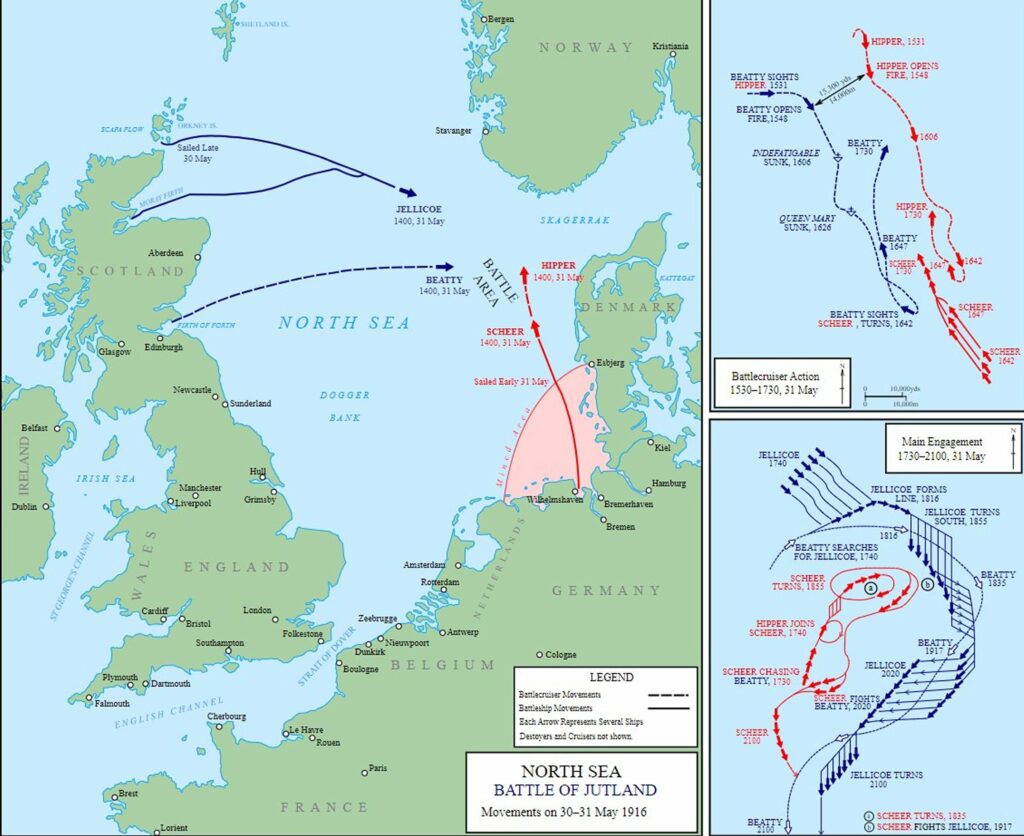John Smith was an eminent pathologist before his retirement – a consultant gynaecological histopathologist and cytopathologist at Sheffield Teaching Hospitals NHS Foundation Trust – but has had a lifelong interest in naval warfare.
Probably to the relief of most of those present, he chose the latter as his subject when he agreed to come and talk to us during our latest meeting at Fulwood Sports Club, and it proved to be an entertaining and enlightening presentation. Most of us had heard of Admiral Jellicoe and the First World War Battle of Jutland without knowing too much about the detail, and these gaps in our knowledge were filled in as the story unfolded.
The Battle of Jutland was a naval battle fought between Britain’s Royal Navy Grand Fleet under Admiral Sir John Jellicoe and the Imperial German Navy’s High Seas Fleet under Vice-Admiral Reinhard Scheer, and it was Jellicoe’s strategy during the battle that led Winston Churchill – then the First Lord of the Admiralty – to describe him as “the only man on either side who could have lost the war in an afternoon.”
Germany’s High Seas Fleet intended to lure out, trap and destroy a portion of the British Grand Fleet, as the German naval force was insufficient to openly engage the entire British fleet. This formed part of a wider strategy to break the British blockade of Germany to allow German naval vessels access to the Atlantic. Meanwhile, the Royal Navy pursued a strategy of engaging and destroying the High Seas Fleet, thereby keeping German naval forces contained and away from Britain and her shipping lanes.
The Germans planned to use Vice-Admiral Franz Hipper’s fast scouting group of five modern battlecruisers to lure Vice-Admiral Sir David Beatty’s battlecruiser squadrons into the path of the main German fleet. They stationed submarines in advance across the likely routes of the British ships. However, the British learned from signal intercepts that a major fleet operation was likely, so on 30 May 1916 Jellicoe sailed with the Grand Fleet to rendezvous with Beatty, passing over the locations of the German submarine picket lines while they were unprepared. The German plan had been delayed, causing further problems for their submarines, which had reached the limit of their endurance at sea.
On the afternoon of 31 May, Beatty encountered Hipper’s battlecruiser force long before the Germans had expected. In a running battle, Hipper successfully drew the British vanguard into the path of the High Seas Fleet. By the time Beatty sighted the larger force and turned back towards the British main fleet, he had lost two battlecruisers from a force of six and four powerful battleships. Beatty’s withdrawal at the sight of the High Seas Fleet, which the British had not known were in the open sea, would reverse the course of the battle by drawing the German fleet in pursuit towards the British Grand Fleet. Between 6.30, when the sun was lowering on the western horizon, back-lighting the German forces, and nightfall at about 8:30, the two fleets – totalling 250 ships between them – directly engaged twice.
Fourteen British and eleven German ships sank, with a total of 9,823 casualties. After sunset, and throughout the night, Jellicoe manoeuvred to cut the Germans off from their base, hoping to continue the battle the next morning, but under the cover of darkness Scheer broke through the British light forces forming the rearguard of the Grand Fleet and returned to port.
Both sides claimed victory. The British lost more ships and twice as many sailors but succeeded in containing the German fleet. The British press criticised the Grand Fleet’s failure to force a decisive outcome, while Scheer’s plan of destroying a substantial portion of the British fleet also failed. The British aim of denying Germany access to both the United Kingdom and the Atlantic did succeed, which was the British long-term goal.
Subsequent reviews commissioned by the Royal Navy generated strong disagreement between supporters of Jellicoe and Beatty concerning the two admirals’ performance in the battle. Debate over their performance and the significance of the battle continues to this day.


